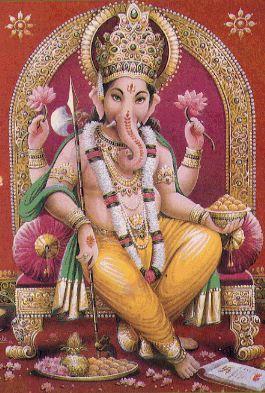Ganesha
|
Etymology and other names

The name Ganesha (also spelled as Ganesa) is a Sanskrit compound, joining the words gana meaning a group, multitude, or categorical system + isha (Sanskrit: ईश; īśa) meaning lord or master. The word gana in association with Gaņeśa is often taken to refer to the gaņas, a troop of semi-divine beings that form part of Lord Śiva's retinue. The term more generally means a category, class, community, association, or corporation. So some commentators interpret the name "Lord of the Gaņas" to mean "Lord of created categories" such as the elements, etc. The translation "Lord of Hosts" may convey a familiar sense to Western readers. The name Ganapati is a synonym, being a compound composed of गण + पति (pati, ruler or lord).
Like other devas (Hindu male deities) and devis (female deities), Ganesha has many other titles of respect or symbolic names, and is often worshipped through the chanting of the Ganesha Sahasranama, which literally means "a thousand names of Ganesha". The Ganesha Sahasranama is part of the Ganesha Purana, a Hindu scripture that venerates Ganesha. Each name in the sahasranama conveys a different meaning and symbolises a different aspect of Ganesha.
The name Vināyaka is a common name for Ganesha both in the Purāṇas and in Buddhist Tantras. This name is reflected in the naming of the famous eight Ganesha (aṣṭavināyaka) temples in Maharashtra. The name Vignesha, meaning "Lord of Obstacles", refers to his primary function in Hindu mythology as being able to both create and remove obstacles (vighna).
The Tamil name for Ganesha is Pillaiyar. According to A. K. Narain, in the Dravidian family of languages pallu, pella, and pell signify "tooth or tusk of an elephant" but more generally "elephant", and in Tamil country pille means a "child" and pillaiyar a "noble child". In discussing the name Pillaiyar, Anita Raina Thapan notes that since the Pali word pillaka has the significance of "a young elephant" it is possible that pille originally meant the young of the elephant.
